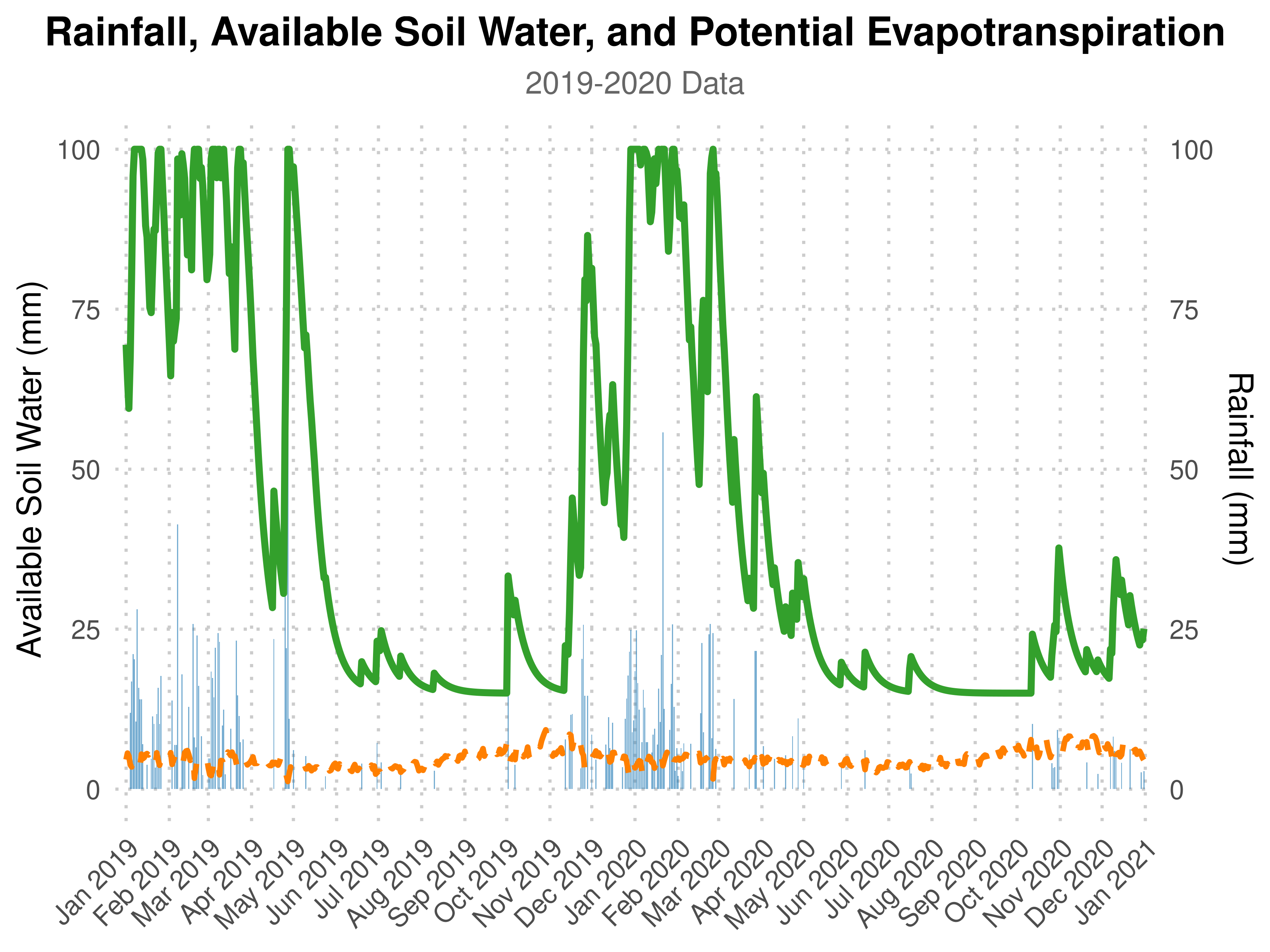
The hardware and bandwidth for this mirror is donated by dogado GmbH, the Webhosting and Full Service-Cloud Provider. Check out our Wordpress Tutorial.
If you wish to report a bug, or if you are interested in having us mirror your free-software or open-source project, please feel free to contact us at mirror[@]dogado.de.
Estimates and predicts the wet
season calendar (WSC) and soil water balance for agricultural
applications. It integrates daily potential evapotranspiration (PET) and
soil water balance parameters to compute the WSC for crop and soil water
management. Using these parameters, AquaBEHER can estimate
and predict the onset, cessation, and duration of the wet season based
on an agroclimatic approach.
AquaBEHER is designed to facilitate water-efficient
agricultural practices in response to climate variability and
change.
install.packages("AquaBEHER")# install.packages("devtools")
devtools::install_github("RobelTakele/AquaBEHER")To view the vignettes in RStudio, run:
vignette("AquaBEHER", "AquaBEHER")Further details regarding AquaBEHER are available on the
package website, visit here.
Here’s a quick example to estimate daily soil water balance:
library(AquaBEHER)
data(AgroClimateData)
# Estimate PET using Penman-Monteith method
PET <- calcEto(AgroClimateData, method = "PM", Zh = 10)
# Add PET to the dataset
AgroClimateData$Eto <- PET$ET.Daily
# Estimate daily soil water balance for a soil with 100mm water holding capacity
watBal.list <- calcWatBal(data = AgroClimateData, soilWHC = 100)
watBal <- watBal.list$data
head(watBal)
#> GridID Lat Lon Elev WHC Year Month Day Rain Tmax
#> 1 MOZ0007149 -15.09238 39.2519 392.1337 97.84914 1982 1 1 0 32.24396
#> 2 MOZ0007149 -15.09238 39.2519 392.1337 97.84914 1982 1 2 0 33.07202
#> 3 MOZ0007149 -15.09238 39.2519 392.1337 97.84914 1982 1 3 0 33.49679
#> 4 MOZ0007149 -15.09238 39.2519 392.1337 97.84914 1982 1 4 0 32.76818
#> 5 MOZ0007149 -15.09238 39.2519 392.1337 97.84914 1982 1 5 0 32.65872
#> 6 MOZ0007149 -15.09238 39.2519 392.1337 97.84914 1982 1 6 0 31.80630
#> Tmin Rs Tdew Uz Eto R AVAIL TRAN DRAIN RUNOFF
#> 1 23.11500 23.86698 20.21160 4.723783 6.447727 0 0 0 0 0
#> 2 23.12585 26.38375 20.48284 4.279407 6.802067 0 0 0 0 0
#> 3 23.12602 25.00704 20.45689 3.622179 6.485418 0 0 0 0 0
#> 4 23.60351 24.16475 20.83896 2.535047 5.838723 0 0 0 0 0
#> 5 22.79294 23.44483 21.36882 1.477617 5.231518 0 0 0 0 0
#> 6 22.43975 21.99277 21.29297 1.953415 5.026133 0 0 0 0 0Visualize the daily soil water balance, rainfall, and potential evapotranspiration (Eto) for the climatological year 2019–2020:
library(ggplot2)
# Filter the data for 2019 and 2020
watBal.19T20 <- watBal[watBal$Year %in% c(2019, 2020), ]
date.vec <- as.Date(paste(watBal.19T20$Year, watBal.19T20$Month, watBal.19T20$Day, sep = "-"), format = "%Y-%m-%d")
watBal.19T20$date <- date.vec
# Plot water balance with ggplot2
ggplot(watBal.19T20, aes(x = date)) +
geom_bar(aes(y = Rain), stat = "identity", fill = "#1f78b4", alpha = 0.6, width = 0.8) +
geom_line(aes(y = AVAIL), color = "#33a02c", size = 1.5) +
geom_line(aes(y = Eto), color = "#ff7f00", size = 1.2, linetype = "dashed") +
scale_x_date(date_labels = "%b %Y", date_breaks = "1 month", expand = c(0.01, 0)) +
scale_y_continuous(
name = "Available Soil Water (mm)",
sec.axis = sec_axis(~., name = "Rainfall (mm)")
) +
labs(
title = "Rainfall, Available Soil Water, and Potential Evapotranspiration",
subtitle = "2019-2020 Data",
x = NULL, y = NULL
) +
theme_minimal(base_size = 15) +
theme(
plot.title = element_text(face = "bold", size = 18, hjust = 0.5),
plot.subtitle = element_text(size = 14, hjust = 0.5, color = "grey40"),
axis.text.x = element_text(angle = 45, hjust = 1),
panel.grid.minor = element_blank(),
panel.grid.major = element_line(linetype = "dotted", color = "grey80")
)
If you used AquaBEHER in your work, please cite it. You
can view the most recent citation by running:
citation(package = "AquaBEHER")To cite `AquaBEHER` in publications, please use:
Robel Takele, Matteo Dell'Acqua (2023). `AquaBEHER`: Estimation and Prediction of Wet Season Calendar and Soil
Water Balance for Agriculture. R package version 1.0.0. Available at
https://cran.r-project.org/web/packages/AquaBEHER
A BibTeX entry for LaTeX users is:
@Manual{,
title = {`AquaBEHER`: Estimation and Prediction of Wet Season Calendar and Soil Water Balance for Agriculture},
author = {Robel Takele and Matteo Dell'Acqua},
year = {2023},
note = {R package version 1.0.0},
url = {https://robeltakele.github.io/AquaBEHER/},
}We appreciate feedback and contributions to improve
AquaBEHER. Feel free to report bugs, suggest features, or
join discussions.
Your contributions make a difference!
✤ We appreciate your support and look forward to making our package even better with your help!

The Genetics Group at the Institute of Plant Sciences is a culturally diverse, research-driven team focused on advancing agricultural innovation. We combine crop genetics, climate science, and participatory strategies to develop sustainable farming solutions.
We are based at Scuola Superiore Sant’Anna, Pisa, Italy.
For inquiries, please reach out to: - Matteo Dell’Acqua - Mario Enrico Pè
Learn more about our work on the institute web page.
If you find AquaBEHER helpful or
interesting, please consider giving us a star on GitHub. Your support
helps promote the project and lets others know it’s worth checking
out.
🙏 Thank you for your support! 👍
👨💻 Robel Takele
Email:
takelerobel@mail.concordia.ca
GitHub: @RobelTakele
👨💻 Matteo Dell’Acqua
Email:
m.dellacqua@santannapisa.it
GitHub: @MatteoDellAcqua
This project is licensed under the GNU General Public License, GPL-3.
These binaries (installable software) and packages are in development.
They may not be fully stable and should be used with caution. We make no claims about them.
Health stats visible at Monitor.